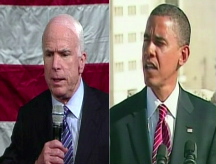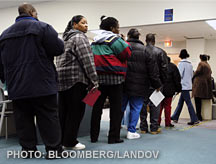Health care: What they're proposing vs. what will pass
McCain and Obama agree we need health care reform, but neither of their plans is likely to pass Congress without drastic changes.
NEW YORK (CNNMoney.com) -- In his Democratic convention acceptance speech sixteen years ago, Bill Clinton declared that as one of the first initiatives of his administration, he would "take on the health care profiteers and make health care affordable for every family."
Two years later, his "Health Security Act" was dead, never having gotten even as far as a vote in Congress.
Nearly two decades of soaring premiums and reduced coverage later, health care is again at the top of the reform agenda in Washington. Barack Obama and John McCain have each issued their own plans for sweeping reform: Obama's would rely on a new National Health Insurance Exchange to allow more businesses and individuals to access cheaper pool coverage, while McCain's would replace the tax deductibility of employer-sponsored coverage with a flat-rate $2,500 per person, per year tax break to be used toward health insurance.
If history proves anything, though, it's that sweeping reforms seldom look the same after going through the crucible of Washington politics - especially when the subject is a highly contentious issue like health care reform. The McCain and Obama plans are just "watercolors," says Len Nichols, health policy director for the New America Foundation, a Washington think tank. What the candidates are proposing, and what will actually pass into law, are likely to look very different.
"Unlike in 1993, Congress is going to own this debate," he predicts. "The president is going to make a speech, and then Congressional committees will do what they're supposed to do - which will make it much more likely to actually work."
The good news, says Nichols, is that there's already been significant bipartisan activity in Congress on health care, making it more likely that reform can move forward without getting bogged down in the kind of partisan battles that doomed the Clinton plan.
For small business owners, action can't come too soon. One upcoming study by Mercer Consulting, according to the National Federation of Independent Businesses, projects that small business health costs will rise 10% next year; a Kaiser Family Foundation survey last year found that the percentage of small firms covering health care had fallen from 68% to 59% since 2000.
NFIB has made health insurance reform a priority this year, co-sponsoring a set of ads starring "Harry and Louise," the fictional couple that the insurance industry used to help defeat Clinton's health plan. (Yes, they even brought back the same actors from the early '90s.)
NFIB legislative policy manager Michelle Dimarob notes that her group hasn't taken a position on either of the candidates' plans: "There's interesting components in both, but there's probably more unanswered questions."
Instead, her organization has focused more on backing broad principles for reform. Its wish list: Increased access to insurance pools, market reforms such as preventing insurance companies from hiking premiums for firms with one employee in poor health, and targeted tax incentives for the small-group and individual market.
After years of talk about reform, Washington observers say the time finally seems right for action. "There is pretty broad interest in doing something to help small employers and workers in small firms because they do have such a high rate of uninsured," says Urban Institute economist Linda Blumberg.
Whatever legislation eventually emerges will probably have its roots in the various Congressional bills already under consideration. One NFIB's Dimarob singles out as especially promising is the Small Business Health Options Program (SHOP) Act, which would allow statewide or nationwide small-business insurance pools, ban rating based on health status, and provide a $1,000 per employee tax credit for small businesses that pay at least 60% of their employees' health premiums.
Introduced in the Senate last year by two Democrats and two Republicans, the SHOP Act has bipartisan support and the backing of several influential lobbying groups, such as the Service Employees International Union and the National Association of Realtors.
Another bill kicking around, the Small Business "Cooperative for Healthcare Options to Improve Coverage for Employees" (Small Business CHOICE) Act, would provide a refundable tax credit of 65% of the cost of premiums, plus allow for increased pooling.
A more ambitious bill that's attracted bipartisan attention is the Healthy Americans Act, introduced in the Senate by Ron Wyden, D-Ore, and Bob Bennett, R-Utah, and in the House by Debbie Wasserman Schultz, D-Fla. and Jo Ann Emerson, R-Mo. The HAA features elements similar to both candidates' plans: Like Obama's, it would create new insurance pools to reduce premiums and administrative costs; like McCain's, it would get rid of the health care tax deduction for employees.
The HAA's sweeping plan would eliminate employer-based insurance entirely. In its place, all Americans would be required to purchase a Healthy Americans Private Insurance (HAPI) plan through new state-run "Health Help Agencies," which would mandate minimum coverage and outlaw discrimination on the basis of preexisting conditions. Subsidies would be available for anyone earning less than 400% of the federal poverty level, and everyone below a designated income level would receive a standard deduction on their taxes.
Individuals would be required to pay for their insurance premiums themselves, but businesses don't get off scot-free: They'll have to help subsidize the system through a new tax, collected by the IRS and then routed back to the state Health Help Agencies. The size of the tax varies based on the size of the business, with small companies paying a fraction of the percentage charged to larger companies. Employers will also be required to "cash out" their current health care payments for the first two years of the new system, converting the money they would have otherwise spent on health insurance premiums directly to wages paid to employees, to compensate them for the loss of employer-provided health benefits. (The new tax would be waived for the first two years for employers making "cash out" payments.)
The HAA got a boost earlier this year when the Congressional Budget Office projected it could be budget-neutral - in other words, pay for itself - within six years. But some wonder if its massive restructuring of the how businesses pay for health care would be too complex. In particular, Blumberg worries, trying to determine how much employers should cough up for their "cash out" payments could be extremely messy: "I applaud the notion, because it's very consistent with economic theory, but I think implementation might cause difficulties."
"It's more structurally sound than the Clinton plan, but it is a very big hill to climb," admits Nichols, who likes the plan.
The wild card here, as with all other plans for a new administration, is the economy, and what it will mean for sweeping programs that are likely to require new government expenditures. "Comprehensive health care reform takes a comprehensive amount of dollars," notes NFIB's Dimarob. She believes this could make plans like the SHOP Act, which are more narrowly targeted to small businesses and the self-employed, more feasible in the short term.
Others, though, say it's unlikely Congress will pass incremental reforms until the larger issues are resolved.
"If there's going to be health reform, you would think it would be folded into something much bigger," says Kaiser Family Foundation vice-president Gary Claxton. "It seems unlikely that small business stuff will go first, until they at least take a shot at more comprehensive reform. If comprehensive reform doesn't happen, then various pieces could break off" - though without broader reform, he notes, it's going to be hard to find money to pay for any kind of subsidies for small-business coverage.
Nichols is buoyed by the fact that the day after the initial Wall Street bailout plan failed, Sen. Max Baucus, D-Mont., held a press conference to stress the need for immediate health reform, regardless of the economic situation. With businesses staggering under rising costs and more Americans going without insurance, the health care situation has grown dire enough that politicians can't postpone taking action much longer.
That said, Nichols predicts it will likely be "a two-year conversation" before anything is resolved.
Claxton, meanwhile, believes that reading tea leaves at this point is a fool's errand: "I don't think the bills that will be primarily discussed have probably been introduced yet." ![]()
Pick one: Your cigarettes or your job
Entrepreneurs look to candidates for health care reform
Sick-leave mandates make businesses queasy
Healthcare biggest headache for small employers
-
The Cheesecake Factory created smaller portions to survive the downturn. Play
-
A breeder of award-winning marijuana seeds is following the money and heading to the U.S. More
-
Most small businesses die within five years, but Amish businesses have a survival rate north of 90%. More
-
The 10 most popular franchise brands over the past decade -- and their failure rates. More
-
These firms are the last left in America making iconic products now in their twilight. More










